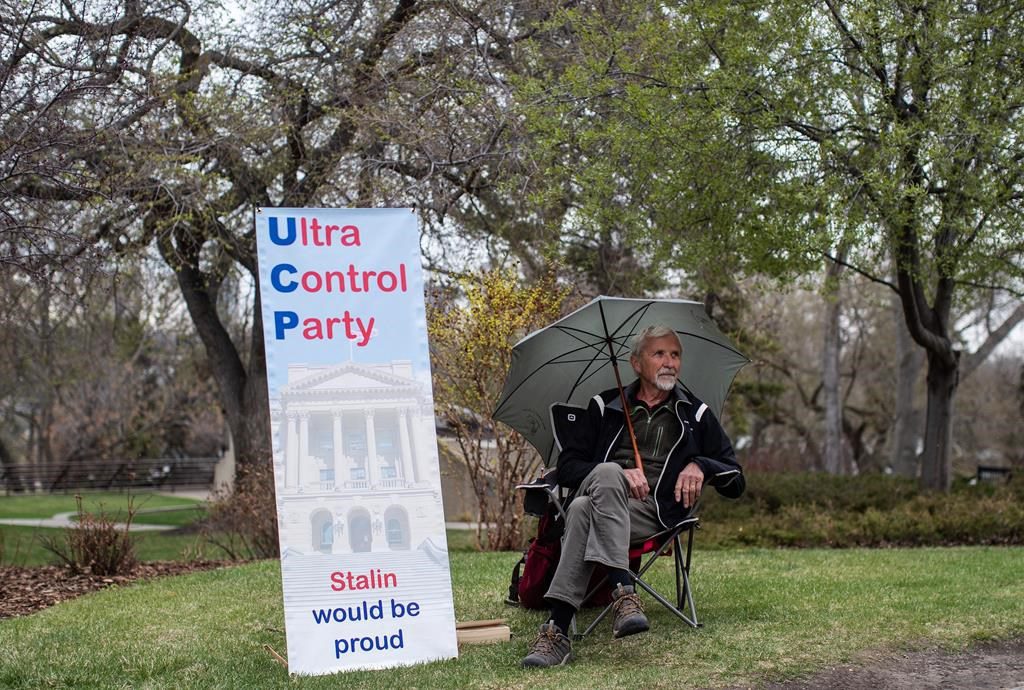EDMONTON — It was a long time ago, but Jan Novotny still remembers the tanks rumbling through his hometown of Prague in 1968 when the Soviet Union enforced its will on the people of what was then Czechoslovakia.
On Monday, he stood outside the Alberta legislature in a gentle rain, holding a sign aimed at the province’s United Conservative Party government saying, “Stalin Would Be Proud.”
“I’m really concerned,” Novotny said on the first day of his protest.
“Democracy is a slippery slope. It can slip into autocracy quite easily. I just find the current government very autocratic in nature.”
Novotny is specifically concerned about a proposed law that would grant Premier Danielle Smith’s cabinet sweeping power to fire local councillors, toss out bylaws, and allow political parties to run in Edmonton and Calgary.
The office of Municipal Affairs Minister Ric McIver did not respond to a question about how much feedback it has received on its proposed legislation, which was introduced April 25.
McIver has promised to amend the bill and discuss the proposed changes with municipal leaders, who say they should have been consulted before the bill was even introduced.
Like other bills and policy balloons Albertans have seen since the 2023 provincial election, it wasn’t part of the UCP’s campaign platform and hasn’t gone before a public comment process.
Novotny is one of an undetermined but increasingly vocal number of Albertans who are concerned about what they call the government’s bossiness.
“I just woke up and said enough is enough,” said Glenda Tailfeathers of Lethbridge, who’s helping organize “Enough Is Enough” protests in several Alberta communities for May 25.
“There’s a lot of interest in people taking a stand,” said Peter Oliver of Project Alberta, an offshoot of a group called Project Calgary.
In one day, the group collected 800 signatures against the proposed legislation.
“The more power they take away from our councils, the more power they put in the hands of corporations and unions,” Oliver said. “It could reach a point where it’s hard to get control back.”
Last week, University of Alberta political science professor Jared Wesley posted an essay warning of a growing authoritarian streak in the UCP government.
“In my two decades of research, I haven’t seen this sort of reaction to anything I’ve written,” Wesley said in an email.
“It’s not just the volume, but the variety of people reaching out. From the left and the right. CEOs to retirees, rural folks and city folks. All of them upset at what a growing number of Albertans are seeing: a government bent on consolidating power.
“You can feel the groundswell, and MLAs are hearing it, too.”
Alberta Municipalities — the organization that speaks for towns, cities, and villages — has also objected.
“Albertans have been clear: they do not want political parties in their local elections,” the organization said in a statement last week. “The provincial government has ignored them, too, deaf to the voices of Albertans.”
Critics say the Smith government has a way of springing controversial legislation on Albertans.
In the last year, the government has: re-introduced the idea of a provincial pension; imposed a moratorium on approvals for renewable power; promised to restrict gender-affirming care for young people; and introduced legislation that would require provincially regulated organizations, including universities, to obtain provincial approvals on federal funding.
Smith has pushed back on criticisms, saying her government is simply responding to concerns from stakeholders and is committed to ensuring other levels of government don’t overstep their authority.
This report by The Canadian Press was first published May 7, 2024.
Bob Weber, The Canadian Press





